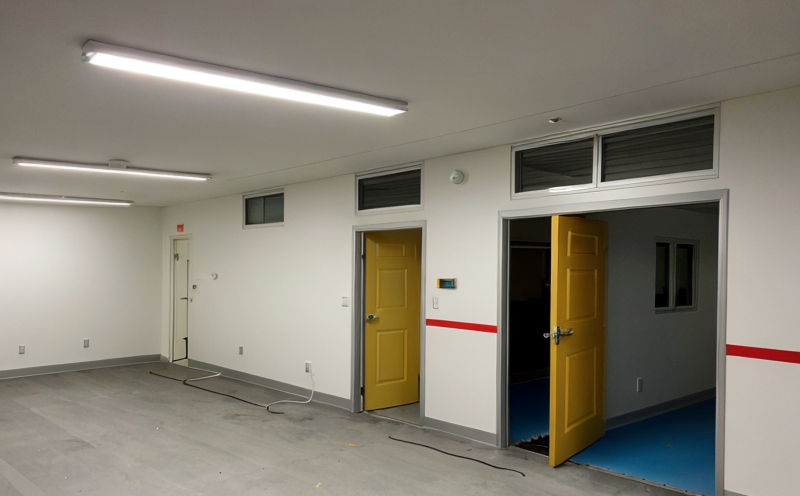ISO 30061 Emergency Lighting Testing for Buildings
The International Organization for Standardization (ISO) has established a comprehensive set of guidelines in the form of ISO 30061, which provides detailed procedures for testing emergency lighting systems. This standard is essential for ensuring that emergency lights meet stringent safety and performance requirements, particularly in buildings where continuous operation during power outages or emergencies is critical.
The primary objective of this testing procedure is to verify the reliability, effectiveness, and compliance with international standards of emergency lighting systems within various types of buildings. Compliance with ISO 30061 ensures that these systems function as intended under specific conditions, which can significantly enhance occupant safety during emergencies.
The standard covers a wide range of testing parameters, including but not limited to, voltage stability, luminance levels, battery performance, and light distribution patterns. Each of these factors plays a crucial role in determining the overall effectiveness of an emergency lighting system. Compliance with ISO 30061 is mandatory for many sectors due to stringent safety regulations.
Testing procedures outlined by ISO 30061 are designed to be rigorous and comprehensive, ensuring that only systems meeting all specified criteria pass inspection. This approach helps mitigate risks associated with potential failures during critical moments when the system needs to perform reliably.
To achieve optimal results from ISO 30061 testing, it is important to follow precise protocols closely aligned with industry best practices. Proper preparation of specimens prior to testing involves careful calibration and setup of equipment according to specified standards. Additionally, selecting appropriate instrumentation that meets the precision requirements set forth by the standard can greatly enhance test accuracy.
Understanding how different environmental conditions might affect performance is also crucial when conducting ISO 30061 tests. Factors such as temperature variations, humidity levels, and other climatic variables can influence the behavior of emergency lights under stress situations. By accounting for these elements during testing, you ensure that your findings accurately reflect real-world scenarios.
- Environmental factors like temperature and humidity can significantly impact how well an emergency light performs when needed most.
- Proper calibration and setup of equipment are essential steps in ensuring accurate test results.
- Selecting suitable instrumentation that meets the specified precision requirements is vital for reliable outcomes.
Benefits
The benefits of ISO 30061 emergency lighting testing extend beyond mere compliance with regulations; they encompass improved safety, enhanced operational efficiency, and reduced risk for building occupants. By adhering to this international standard, organizations not only fulfill legal obligations but also demonstrate a commitment to upholding high standards of care.
- Ensures that emergency lighting systems operate correctly even during critical situations.
- Reduces potential risks associated with failures or malfunctions in crucial moments.
- Promotes better overall safety measures within buildings by ensuring that all necessary components are functioning properly.
Quality and Reliability Assurance
The process of ISO 30061 emergency lighting testing focuses heavily on maintaining consistent quality across all aspects of the system. This includes regular inspections, detailed documentation, and continuous monitoring to ensure ongoing compliance with established standards.
In addition to initial certification tests, periodic retesting is recommended to maintain the integrity of the system over time. Regular audits help identify any areas requiring attention or improvement before they become significant issues. Continuous quality assurance programs play a vital role in keeping emergency lighting systems performing optimally throughout their lifecycle.
Environmental and Sustainability Contributions
- By ensuring that emergency lights are efficient and reliable, ISO 30061 testing supports efforts towards reducing energy consumption in buildings.
- The standard encourages the use of low-energy bulbs, which contribute positively to environmental sustainability goals.
- Compliance with ISO 30061 helps reduce waste by promoting longer-lasting and more durable light fixtures.





